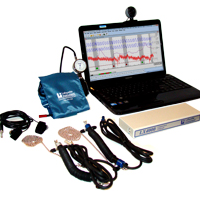Widely Used Polygraph Test Proves Faulty
 LX4000 polygraph (photo: Lafayette Instrument)
LX4000 polygraph (photo: Lafayette Instrument)
Government agencies and law enforcement departments have continued to rely on a certain type of polygraph, even though some people may have been wrongly accused of lying while others may have gotten away with lying on the test.
An investigation by McClatchy Newspapers focused on the LX4000, one of the most popular polygraphs in use. Some operators of the machine noticed a decade ago that it does not always accurately measure the sweat of people being tested, which can result in them flunking the test.
The U.S. Air Force’s Office of Special Investigations detected a problem with the machine in 2002, the year after it came on the market. They notified the manufacturer, Lafayette Instrument Co. Inc., who advised them how to work around the glitch—by using a manual mode of testing rather than the less effective but easier-to-use automatic mode. However, they apparently did not correct the problem or notify other users of the equipment. Instead, word spread through the grapevine—agency to agency—that the LX4000 was faulty.
Still, some agencies have not stopped using the LX4000, including officials who were not even aware of its technical problem until the news service informed them about it.
“As a result, innocent people might have been labeled criminal suspects, faced greater scrutiny while on probation or lost out on jobs. Or, just as alarming, spies and criminals may have escaped detection,” wrote Marisa Taylor of McClatchy.
Indeed, hundreds of thousands of Americans have been tested on the machine—and their lives affected by the results—since the problem was first detected. Although use of polygraphs by private employers was banned 25 years ago, more than 70,000 people are tested annually by federal agencies alone. Most of these people are not allowed to challenge the test results in court.
The Federal Bureau of Investigation performs about 13,000 polygraphs per year. Forty percent of all special agent applicants aren’t hired due to their polygraph test results.
“We’re talking about using a procedure that has a very weak scientific foundation and making it worse,” William Iacono, a University of Minnesota psychology professor and polygraph researcher told McClatchy. “I already don’t have very much confidence in how government agencies conduct these tests. Now, they might as well be flipping a coin.”
Lafayette, LX4000’s manufacturer, says the scoring differences occur only occasionally, labeling the phenomenon as “rare.”
-Danny Biederman, Noel Brinkerhoff
To Learn More:
Glitch in Widely Used Polygraph Can Skew Results (by Marisa Taylor, McClatchy)
FBI Turns Away Many Applicants Who Fail Lie-Detector Tests (by Marisa Taylor, McClatchy)
Congress Orders Border Patrol to Polygraph All Applicants (by Noel Brinkerhoff, AllGov)
- Top Stories
- Unusual News
- Where is the Money Going?
- Controversies
- U.S. and the World
- Appointments and Resignations
- Latest News
- Trump to Stop Deportations If…
- Trump Denounces World Series
- What If China Invaded the United States?
- Donald Trump Has a Mental Health Problem and It Has a Name
- Trump Goes on Renaming Frenzy






Comments